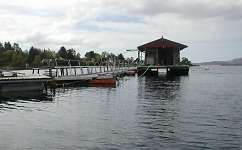Marine bacteria unfazed by rising ocean acidification

Bacteria are more resistant to ocean acidification than previously thought, say scientists.
Ocean acidification is one of many problems caused by carbon dioxide emissions. Burning fossil fuels releases carbon dioxide that is eventually absorbed by the oceans, making the water more acidic.
The new study, published in Environment Microbiology Reports, shows for the first time that even if ocean acidification reaches the levels predicted for the year 2100, the bacterial community will remain unaffected.
Marine bacteria play important roles in the cycling of carbon – the flux of carbon dioxide (CO2) between the oceans and the atmosphere – so if they were affected by ocean acidification it could have catastrophic consequences,' says Dr Christopher van der Gast of NERC's Centre for Ecology & Hydrology, lead researcher on the project.
The team studied the direct responses of bacterial communities to rising carbon dioxide levels by sampling six mesocosms –11,000 litre bags of seawater taken from a fjord in Bergen, Norway.
Carbon dioxide was bubbled through three of these bags and measured how the bacteria responded to the elevated levels. The remaining three bags were used as controls.
'We were expecting to see some evidence of change or at least resilience as a result of elevated carbon dioxide levels,' says van der Gast. 'But what we actually saw was resistance; the bacterial communities barely changed at all.'
'The mesocosm experiment was like hitting the bacterial system with a massive stick. You take bacteria in their current environment, from current carbon levels and then suddenly switch it to the levels 100 years in the future. But it didn't faze them,' van der Gast continues.
He suspects that the resistance of marine bacteria to ocean acidification means they will be able to evolve an even higher level of resilience before 2100, as they get used to higher acid levels.
'Hitting them with a big stick we see a huge capacity for resistance, but over the long term they have an enormous evolutionary capacity, he says. ' Over the next 100 years there will be millions of generations of bacteria, so if we still have a steadily increasing amount of carbon dioxide, as is predicted, being absorbed into oceans the bacterial communities will adapt.'
Provided by PlanetEarth Online
This story is republished courtesy of Planet Earth online, a free, companion website to the award-winning magazine Planet Earth published and funded by the Natural Environment Research Council (NERC).


















